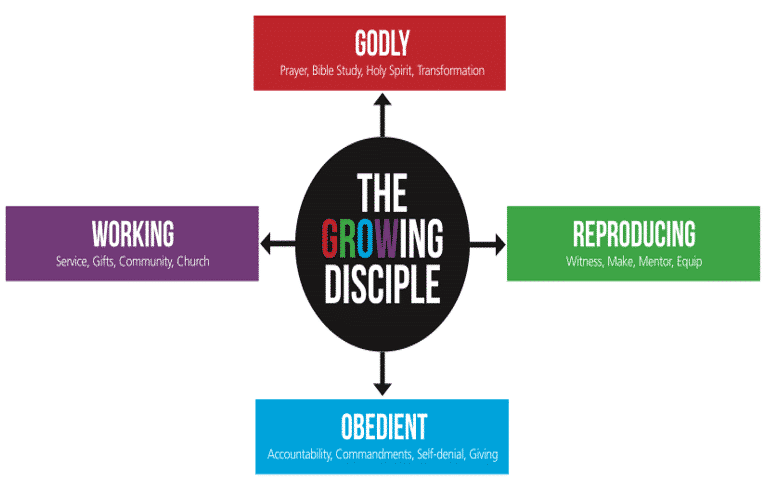When you hear the word “grow,” what comes to your mind? Many people will think of something related to nature such as a garden or flowers, or maybe the way in which a tiny seed can grow into a majestic tree. Or, perhaps you think of human growth; for example, the way a baby grows into a toddler, preschooler, elementary-age child, teenager, and reaches adulthood. Growth is life.
Similarly, growth is an integral part of spiritual life or should be: Jesus reminded us of it saying: “I am the vine, you are the branches. He who abides in Me, and I in him, bears much fruit. . . By this My Father is glorified, that you bear much fruit; so you will be my disciples.” (John 15:5, 8 NKJV) If we cease to seek out growing opportunities, our growth is stunted. Just as a flower does not independently stop growing one day and say, “I am tall enough; I am beautiful enough,” we cannot stop seeking to grow spiritually because we think we are “spiritual enough” or are “close enough to God.”
As we discussed in our last blog, in 2014 the South Pacific Division (SPD) of the Seventh-day Adventist Church commissioned a research team from Avondale College of Higher Education to investigate the nature of discipleship. The aim of the research project was twofold: to provide an objective description of a Seventh-day Adventist disciple of Jesus, and to provide a criterion/criteria by which the attainment of discipleship may be measured and shared in the context of the Church’s mission. Both quantitative and qualitative data were collected as part of this project.
During the qualitative research portion of this study issues related to growth and accountability in a personal relationship with God emerged. This emphasized the need to develop a personal discipleship measurement tool. Thus, the Avondale College of Higher Education prepared a draft of this measurement tool and used it as a trial.
This survey was developed and given to 200 respondents, with 185 of them completing the entire survey. The primary purpose of this research was to test the validity of the developed instrument. The first part of the survey evaluated areas that contribute to one’s ability to grow in relationship with Jesus, demonstrate Christlike character, faithlully participate in church services, and follow God’s will. Growth in these areas was measured by three scales with the following statements, each statement had five options starting from “Always true” and ending with “Seldom true.”
Spiritual disciplines
- I spend time reading the Bible each day.
- I commit daily time to meditating on the Word of God.
- Every day I ask God to send the Holy Spirit to guide me.
- I spend time each day memorizing Scripture passages.
- Loving my community
- I show patience and kindness to those around me, even when I am mistreated.
- I confess to others when I have wronged them in some way.
- I seek forgiveness from those I hurt.
- I show love for my family by unselfishly trying to meet their needs.
- Faithful participation
- I attend church each week.
- I attend Sabbath School each week.
- My loyalty to following Christ stays strong even when things go wrong.
- I am willing to do what God asks of me.
The second section of the survey evaluated additional areas of spiritual life that contribute to one’s ability to engage in discipling. It included four scales with more than fifty statements in total. Some of examples on each area you can see below:
- Spiritual Identity
- God gives me the desire to obey Him.
- I accept Jesus’ righteous, perfect life, as a substitute for my own sinful life.
- Every Christian is called to be a disciple of Jesus Christ.
- Serving my Community
- I look for people who are in need that I can help.
- I make personal sacrifices so that I am able help others.
- I willingly give of my time so that I can help others.
- Sharing Jesus
- I regularly talk with people outside my church family about my faith.
- I regularly talk with others about my faith in Jesus.
- I look for opportunities to speak about Jesus to others.
- I invite friends to attend worship or small group gatherings with me.
- Spiritual Gifts
- I see positive results from using the spiritual gifts God has given me.
- Other Christians have identified and encouraged my spiritual gifts.
- I am aware of the spiritual gifts God has given to me.
All responses were collected online most of the participants were members of the Seventh-day Adventist church, and the two largest age groups were 45-54 and 55-64 years of age. The testing of the instrument resulted in the shortening of the survey from 80 to 71 questions. The analysis of the seven scales in the quantitative study brought to researchers’ attention a need to modify a tentative diagram or model of the “Growing Disciple” which they created as a result of their preliminary research and qualitative study. The model uses the acronym GROW explaining four major characteristics of a disciple of Christ: godly, reproducing, obedient, and working.

This trial of the measurement tool can have long-lasting effects. The SPD made a great step forward in a quest for an effective discipleship model and a tool of discipleship measurement. This can be a valuable contribution to the global Seventh-day Adventist Church.
As believers, we know that when we align ourselves more closely with our Creator, spending time with Him through prayer and reading the Bible, living in community with others who love Him, and using our gifts to minister to those around us, we are able to better disciple others.
By developing a relationship with God, working to share His love with others and bring them into His family, being obedient ourselves to His commands, and using our gifts to further the kingdom, we can grow ourselves – and those around us – in the realm of discipleship. After all, as we said before, growth is a part of life.
If you wish to read more about discipleship and the SPD research, download the Journal of Adventist Mission Studies, Vo. 12, No. 2, 2016, found here.
Creado en colaboración con el Instituto del Ministerio de la Iglesia (Institute of Church Ministry).
Published by ASTR

